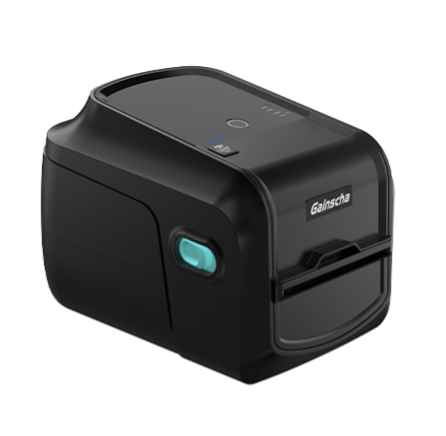I. Common Situations Where Label Barcode Printers Get Jammed
Label barcode printers are essential devices in industries such as logistics, retail, and manufacturing. However, paper jams are a common and frustrating issue during daily use. Industry analyses indicate that two-thirds of barcode printing workflows are disrupted by unscheduled paper jams, forcing 65% of users to manually intervene mid-operation. So, what are the reasons behind these frequent jams?
II. Main Causes of Printer Jams
1. Paper Quality Issues
Uneven Paper Thickness:
The uneven thickness of label paper can prevent it from smoothly passing through the print head and rollers, especially during high-speed printing. Industry standards specify that the thickness of label paper should be between 0.06mm and 0.1mm; otherwise, paper jams are likely to occur.
Adhesive Leakage:
Some low-quality label papers have adhesive that leaks under high temperatures, sticking to the rollers and print head, increasing friction and eventually causing jams.
2. Incorrect Printer Settings
Overly High Printing Speed:
Many users set the printing speed to the maximum to improve work efficiency but ignore the load capacity of the device. Excessive speed can cause unstable paper feeding, resulting in jams at the paper exit.
Incorrect Paper Type Selection:
Printers usually support multiple paper type settings, such as continuous paper, gap paper, etc. Using paper that contradicts the selected media profile prompts the printer to generate incorrect thickness/texture readings, ultimately precipitating paper jams during automated feeding.
3. Insufficient Equipment Maintenance
Dust Accumulation on the Print Head:
A print head that has not been cleaned for a long time accumulates dust and paper debris, hindering smooth paper feeding. It is recommended to perform a full cleaning after every 10,000 labelsprinted.
Aging or Worn Rollers:
Without the precision-engineered rollers, printers would fail to deliver consistent paper advancement, leading to jams or misfeeds. Over time, they wear out, reducing friction and causing paper to fail to pass through smoothly.

III. Analysis of Hidden Reasons for Paper Jams
Aside from the common causes, there are some hidden issues that are not easily noticed but can lead to printer jams.
1. Static Electricity Accumulation
In dry environments, the friction between paper and the printer generates static electricity, particularly when humidity is below 30%. This static causes label papers to stick together, preventing smooth separation and causing jams.
Solution:
Place a small humidifier near the printing area to maintain the humidity between 40% and 60%to reduce static interference.
2. Sensor Errors
Barcode printers have multiple sensors that detect the paper's status and position. If these sensors are covered with dust or become misaligned, the printer may incorrectly detect the presence or size of the paper, causing interruptions or jams.
Solution:
Regularly inspect and clean the sensors to ensure there are no obstructions.
3. Incorrect Label Spacing Settings
Some printers require precise recognition of label spacing for smooth operation. If the spacing is set incorrectly, even a 0.5mm deviationcan cause the printer to fail in paper detection.
Solution:
Before printing, ensure that the spacing settings match the actual labels and perform a test print.
IV. How to Effectively Prevent Label Barcode Printer Jams
To minimize the frequency of printer jams, consider the following preventive measures:
1. Choose High-Quality Consumables
Use label paper that meets industry standards, ensuring even thickness and no adhesive leakage.
Avoid using low-quality thermal paper that may wrinkle or jam during printing.
2. Regular Equipment Maintenance
Clean the Print Head:Use specialized cleaning tools for deep cleaning once a month.
Inspect the Roller Condition:If severe wear is observed, replace it promptly.
3. Proper Operating Procedures
Gently guide the paper out instead of yanking it hard—this helps keep the machine's internal parts intact.
Adjust the printing speed to a reasonable level, generally recommended below 150mm/s.
V. Conclusion
Although label barcode printer jams are common, they are not impossible to resolve. By choosing quality consumables, regularly maintaining the equipment, adjusting the correct printing parameters, and paying attention to static electricity and sensor conditions, the probability of jams can be significantly reduced.
For business users, regular inspection and maintenance of printing equipment not only extend the device's life but also improve work efficiency. Understanding these hidden causes will help you better maintain your label barcode printer and reduce unnecessary downtime.
Next time you encounter a printer jam, check these details mentioned above—you may quickly find the root of the problem.








